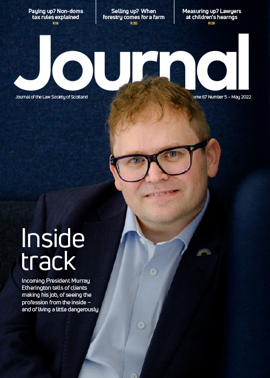Scottish Solicitors' Discipline Tribunal
Kenneth John Baillie Stewart MacLeod
A complaint was made by the Council of the Law Society of Scotland against Kenneth John Baillie Stewart MacLeod, MacLeods WS, 13 Lombard Street, Inverness. The Tribunal found the respondent guilty of professional misconduct in respect of his breaches of rule 3 of the Solicitors (Scotland) Practice Rules 1986, rules 1, 2, 3, 6, 7 and 9 of the Solicitors (Scotland) (Standards of Conduct) Practice Rules 2008, and rules B1.2 and B1.9 of the Law Society of Scotland Practice Rules 2011.
The Tribunal ordered that the name of the respondent be struck off the Roll of Solicitors in Scotland. The Tribunal also directed the respondent to pay £5,000 by way of compensation to the secondary complainer.
At the respondent’s suggestion, the respondent’s client, the secondary complainer, provided funds to company 1 by way of an investment or loan. The respondent acted for Mr X, company 1 and the secondary complainer. Their interests were in conflict. This conflict existed long before the respondent became a director of company 1. The respondent was heavily involved in the financing and provision of business and financial advice to company 1. He invested in the company himself. He was appointed as a director of the company in June 2011. The respondent did not advise the secondary complainer of this highly relevant information. He failed to advise him of Northern Constabulary’s objections to Mr X as manager of an HMO. This information was given to the respondent on the basis that it was not to be disclosed more widely. The respondent was therefore in a difficult predicament but this was created by his own decision to act in a conflict of interest situation. The respondent’s explanation regarding the witness protection scheme appeared fanciful. However, even on the basis this explanation was correct, it was insufficient to overcome the need to make some disclosure to the secondary complainer, and/or to withdraw from acting for both clients. The respondent was in possession of information which was potentially damaging to his client, the secondary complainer, but he could not or did not tell him about it. In addition, the respondent failed to tell the secondary complainer about the trading difficulties encountered by company 1 and Mr X. He failed to advise the secondary complainer of the dissolution of company 1. Throughout, the respondent failed to give independent advice to the secondary complainer. His failure to advise the secondary complainer could only have been to protect himself and company 1/Mr X. The respondent’s conduct breached the practice rules regarding trust and personal integrity, independent advice, acting in the best interests of his clients, conflict of interest and disclosure of interest, and effective communication. His behaviour constituted a serious and reprehensible departure from the standards of competent and reputable solicitors. He was accordingly guilty of professional misconduct.
Martin Grahame Hogg
A complaint was made by the Council of the Law Society of Scotland against Martin Grahame Hogg, solicitor, Cumbernauld. The Tribunal found the respondent guilty of professional misconduct in cumulo in respect of breaches of rules B6.7.1, B6.7.3, B6.11, B6.23, B6.15.1, B6.4.1, B6.13.2 and B6.13.3, all of the Society’s Practice Rules 2011.
The Tribunal censured the respondent.
Solicitors must keep proper accounting records (rule B6.7.1). The respondent breached this rule. He did not balance his client account for a period of years. He operated another client account without reconciling it. Solicitors must balance the firm account monthly (rule B6.7.3). The respondent breached this rule, and as a result it was not possible to ascertain the true financial position of his practice unit for a period of years. Solicitors must deal with credit balances (rule B6.11). The respondent breached this rule in respect of six accounts. Solicitors must comply with the Money Laundering Regulations and demonstrate that to their regulators (rule B6.23). The respondent failed to maintain procedures to meet his obligations including client due diligence and risk assessment procedures.
A practice unit shall deliver accurate accounts certificates to the Society (rule B15.1). The Society is entitled to rely on the information contained with accounts certificates to monitor risk and target regulatory activity (rule B15.2).
The respondent breached these rules and was reckless by completing inaccurate accounts certificates. Solicitors must remedy breaches of rule B6 promptly (rule B6.4.1). He failed to do so. Cashroom managers have specific responsibilities (rule B6.13). The respondent breached his obligations by failing to use reasonable endeavours to acquire and maintain the competencies and skills of a cashroom manager and discharge his duties. He was accordingly guilty of professional misconduct.
Benjamin Nephi Hann
A complaint was made by the Council of the Law Society of Scotland against Benjamin Nephi Hann, Hann & Co Solicitors, 83 Princes Street, Edinburgh. The Tribunal found the respondent guilty of professional misconduct in respect of his conduct which led to conviction for a domestically aggravated contravention of s 38(1) of the Criminal Justice and Licensing (Scotland) Act 2010.
The Tribunal censured the respondent.
The respondent pleaded guilty to the offence. He was fined £400. The basis of the plea was that the respondent had repeatedly attended at his wife’s home uninvited, repeatedly loitered outside her home, left flowers for her, repeatedly sent messages to her via text message and social media, repeatedly posted messages on social media to her and repeatedly attended at places where he knew or suspected she would be present.
The respondent’s conduct represented a serious and reprehensible departure from the standards of competent and reputable solicitors and called his integrity into question. The conduct occurred in the context of a complicated relationship which had started in difficult circumstances and ended in a very turbulent fashion. However, the respondent had exercised very bad judgment in continuing to contact his wife. Society today rightly views domestic incidents seriously and a failure to act with integrity in this context negatively affects the reputation of the profession.






